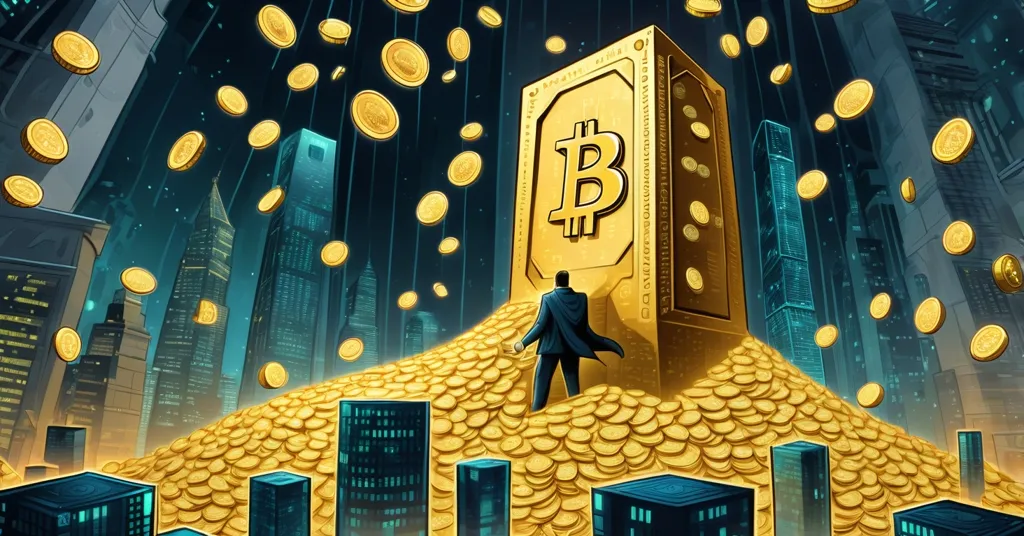Berkshire Hathaway’s $381.6B Cash Hoard and Buffett Exit: Crypto’s Big Opportunity

Berkshire Hathaway’s $381.6 Billion Cash Pile and Buffett’s Exit: A Crypto Wake-Up Call
Warren Buffett’s Berkshire Hathaway just dropped a bombshell with a 34% surge in quarterly earnings and a record-breaking $381.6 billion cash hoard—a sum that could dwarf entire crypto markets if ever unleashed. For those of us rooted in Bitcoin and decentralized finance, this financial giant’s moves, paired with Buffett’s planned exit as CEO by the end of 2025, beg the question: does this old-guard caution signal a gaping opportunity for blockchain to disrupt traditional titans?
- Earnings Powerhouse: Q3 operating earnings soared 34% to $13.485 billion, fueled by a 200% jump in insurance profits.
- Cash Fortress: A colossal $381.6 billion in reserves sits idle, with no share buybacks or major equity bets.
- Leadership Shakeup: Buffett steps down by 2025, passing the torch to Greg Abel, triggering an 11.5% stock drop and investor jitters.
Berkshire’s Financial Might: Unpacking the Numbers
Berkshire Hathaway’s third-quarter performance is nothing short of staggering. Operating earnings climbed to $13.485 billion, a 34% leap from last year, driven largely by a 200% spike in insurance underwriting income to $2.37 billion. For the uninitiated, underwriting income is the profit insurers like Berkshire’s GEICO make from premiums after paying out claims and covering costs—a critical cash engine. Add in gains from stock holdings, and total Q3 earnings rose 17% to $30.8 billion. These figures cement Buffett’s reputation as a financial wizard, churning out cash flows that would make even the most aggressive DeFi yield farms blush.
Yet, beneath the headline numbers lies a curious restraint. Berkshire sold off equities for a tidy $10.4 billion in taxable gains—profits from selling stocks that are subject to tax—while opting against repurchasing any of its own shares in the first nine months of 2025. This is a sharp pivot from Buffett’s past playbook, where buybacks signaled confidence in undervalued stock. Meanwhile, a $9.7 billion acquisition of Occidental Petroleum’s petrochemical unit, OxyChem, in October 2025 marks Berkshire’s biggest deal since 2022’s $11.6 billion Alleghany purchase. It’s a bold play, but with Class A and B shares up only 5% year-to-date—trailing the S&P 500’s 16.3% rally—it feels more like a calculated jab than a knockout punch. For more on their financial performance, check out the detailed report on Berkshire Hathaway’s 34% earnings jump and record cash reserves.
Cash Hoard Conundrum: A Crypto Lens on $381.6 Billion
Let’s talk about that $381.6 billion cash pile—a record high that could single-handedly reshape markets. For Bitcoin maximalists, this is a glaring missed bet. Why hoard fiat, which central banks can devalue through endless printing, when Bitcoin offers a hard money alternative with a fixed supply of 21 million coins? Just 1% of that cash, or $3.8 billion, could snap up over 60,000 BTC at $60,000 per coin, rivaling the holdings of major institutional players. In a year where institutional crypto adoption is hitting new peaks in 2025, Buffett’s aversion to digital assets—famously calling Bitcoin “rat poison squared”—reeks of stubborn denial.
Flip the coin, though, and there’s a lesson in Buffett’s caution. The crypto space is no stranger to speculative frenzies and rug pulls—projects imploding overnight because capital was flung at hype over fundamentals. Buffett’s restraint might be a reminder to avoid bubbles, a discipline our ecosystem often lacks when the next shiny token pumps 100x on a tweet. Still, as decentralized finance (DeFi) platforms innovate with yield-generating protocols, Berkshire’s idle fortune feels like a dinosaur’s hoard in a world racing toward blockchain disruption.
Altcoin advocates might see parallels too. Berkshire’s value-driven OxyChem deal mirrors the ethos of projects like Ethereum, where long-term utility—think smart contracts powering decentralized apps—trumps short-term mania. Polkadot’s focus on interoperable blockchains also echoes Buffett’s knack for connecting diverse business units under one umbrella. While Bitcoin remains king for store-of-value purists, these altcoin niches fill gaps BTC doesn’t, much like Berkshire’s acquisitions target specific industry plays.
Buffett’s Exit: Succession Risks and Market Tremors
Beyond the balance sheet, a seismic shift looms for Berkshire. At 96, Warren Buffett announced he’ll step down as CEO by the end of 2025, ceding control to Greg Abel, Vice Chair of non-insurance operations. This isn’t just a changing of the guard; it’s a potential unraveling of the “Buffett premium”—the unique trust and value investors attribute to the company purely because of Buffett’s legendary track record. Think of it as a celebrity halo effect baked into the stock price. The market’s reaction was swift and brutal: B shares plummeted 11.5% post-announcement, with dips nearing 15% in August.
Analysts are sounding alarms over this transition. Keefe, Bruyette & Woods downgraded Berkshire’s Class A shares to “underperform,” citing not just succession risks but operational challenges like potential peak margins at GEICO, falling reinsurance prices, and broader economic pressures. Their take is scathing:
“Buffett’s likely unrivaled reputation and what we see as unfortunately inadequate disclosure could push investors away once he’s no longer the day-to-day guy.” – Meyer Shields and Jing Li, Keefe, Bruyette & Woods
Meyer Shields also pointed to an almost cult-like devotion among investors, noting that for many, Berkshire’s appeal begins and ends with Buffett himself. On the flip side, operational risks in traditional sectors—like insurance facing competitive squeezes or railroads grappling with tariff impacts—highlight cyclical vulnerabilities that crypto, with Bitcoin’s fixed supply, often sidesteps.
Not everyone is bearish, though. Voices within the Berkshire orbit express confidence in Abel’s capabilities and the conglomerate’s fundamentals. Chris Bloomstran of Semper Augustus Investments Group offered high praise:
“Everybody I know inside the Berkshire world has nothing but rave reviews and good things to say about Greg.” – Chris Bloomstran
Henry Asher of Northstar Group doubled down on the enduring strength of Berkshire’s operations:
“You’re not going to cancel your shipment on the Burlington Northern because Buffett isn’t there. The businesses will continue to produce mammoth amounts of cash flow, with or without Buffett.” – Henry Asher
Decentralization’s Edge: Charisma vs. Code in the Crypto Mirror
For those of us in the crypto trenches, Berkshire’s succession drama is a glaring validation of why decentralization reigns supreme. Buffett’s personal brand has propped up the company’s value for over six decades, much like Satoshi Nakamoto’s enigmatic presence gave Bitcoin an early mystique. But here’s the difference: when Satoshi disappeared, Bitcoin didn’t falter. It grew stronger, fueled by a distributed network of miners, developers, and believers who don’t need a figurehead to sustain trust. Can Berkshire replicate that resilience, or will Abel’s rise expose the fragility of a system tethered to one man’s charisma?
Look at Ethereum’s journey for proof of decentralization’s power. Its shift to Proof-of-Stake—a massive upgrade slashing energy use and centralizing some control—wasn’t derailed by any single leader’s exit. It was a messy, community-driven slog, but it worked because trust lives in the code, not a corner office. Compare that to Berkshire’s stock tanking on mere news of Buffett’s departure, and the contrast is stark. Bitcoin’s genius lies in its immunity to such human drama—no CEO can retire, no boardroom can botch a handover, and no personal “premium” can crash the system. It’s unshakeable math over fleeting fame.
This isn’t just a theoretical jab at traditional finance. If Berkshire’s stock continues to wobble, risk-averse capital might seek safe havens—potentially flowing into Bitcoin as a hedge against broader market unease. Back in 2017, Buffett scoffed at crypto as a speculative bubble, saying he’d never own any. Yet, with institutional giants like BlackRock and Fidelity stacking BTC via ETFs in 2025, his dismissal feels like a relic. Could Abel, a younger leader, soften Berkshire’s stance on digital assets? It’s a long shot, but stranger pivots have happened when new blood takes the helm.
Key Questions for Crypto Enthusiasts on Berkshire’s Moves
- What does Berkshire’s $381.6 billion cash reserve mean for crypto markets?
Direct impact is unlikely given Buffett’s Bitcoin skepticism, but it underscores the sheer scale of traditional capital that could one day pivot to digital assets if attitudes shift, potentially spiking adoption overnight. - Could Buffett’s exit indirectly sway crypto sentiment?
Absolutely—if Berkshire’s stock falters further, it might rattle wider markets, nudging jittery investors toward Bitcoin as a perceived safe haven amidst traditional finance uncertainty. - What lessons does Berkshire’s succession risk hold for blockchain projects?
It’s a stark warning against over-reliance on figureheads; decentralized systems like Bitcoin thrive because trust is embedded in code and community, not charisma—a blueprint for resilience. - Why should crypto investors track giants like Berkshire?
Their moves shape macroeconomic tides—deals like the $9.7 billion OxyChem acquisition signal where big money sees value, offering clues on economic shifts that ripple into crypto market trends. - Could Berkshire ever embrace Bitcoin or DeFi under new leadership?
While Buffett’s “rat poison” stance holds firm, a successor like Abel might rethink crypto as institutional adoption grows; even a tiny allocation from that cash pile could jolt BTC’s price.
Berkshire Hathaway’s latest chapter is a masterclass in financial muscle, but it also exposes the creaky limits of centralized legacies in a world ripe for blockchain disruption. That $381.6 billion cash mountain could fund countless DAOs or ignite the next killer dApp, yet it gathers dust while Buffett plays it safe. Greg Abel’s upcoming reign will test whether a conglomerate forged by one man’s vision can evolve without him—or if it’s doomed to lag behind decentralized tech’s relentless march. For us in the crypto space, it’s a loud reminder: the future isn’t built on boardrooms or billionaires, but on code that can’t be sidelined. Will traditional giants ever catch up to Bitcoin’s revolution, or are they destined to watch from the sidelines as we redefine money itself?



